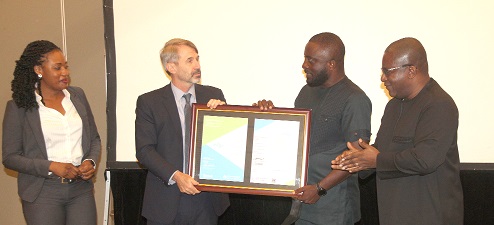
The Ghana Infrastructure Investment Fund (GIIF) has partnered with the International Finance Corporation (IFC), a member of the World Bank Group, to introduce a standardised and certification system in the country.
Known as the Excellence in Design for Greater Efficiencies (EDGE), it will help developers reduce energy consumption in buildings while lowering greenhouse-gas emissions to ultimately move the construction industry in Ghana to a lower carbon and a more resource-efficient path through certified green buildings.
The system provides a free software that allows designers to assess the resource efficiency level of buildings using various options and alternative materials. EDGE is an innovation of IFC which aims to help property developers create resource-efficient buildings quickly, easily and make them affordable.
Improving infrastructure
At a workshop in Accra to train some developers, architects and other individuals within the construction ecosystem in how to operate the software, the Chief Executive Officer (CEO) of the GIIF, Solomon Amponsah, said the move was to ensure that the country’s infrastructure improved significantly.
Additionally, he said it would ensure that all projects were climate friendly, sustainable and did not cause harm to the environment.
So for buildings to be as environmentally friendly as possible, they can apply for EDGE certification which tells everybody they have reached a certain standard in terms of climate and friendliness and sustainability,” he said.
Going forward, he said the GIIF was looking at addressing the housing deficit in the country.
We believe that there is strong shortage of affordable housing. We are looking into whether we can play a role in constructing new types of housing that will be affordable but also attractive to average earning Ghanaians,” he said.
Read also: We’re cautious in piloting e-Cedi
He said his outfit was trying to raise some funding from international sources and was hoping that a significant intervention would be made in soon.
Environment risk
The IFC Country Manager, Kyle Kelhofer, recounted that the World Economic Forum in its 2020 Global Risks report identified top 10 risks up to the year 2030 and beyond in terms of likelihood of occurrence and impact.
Out of the 10, he said seven of them were of environmental and social nature.
Per the report, Kelhofer noted that climate now toped the risks agenda at the global stage while economy, which was the core risk some 10 years ago, had disappeared from the top five risks on the global stage.
That, the country manager said, highlighted the importance of climate issues in the global discourse and the relevance of the GIIF’s collaboration with the IFC.
He said EDGE was the surest way to reduce the risk as it was the measurable way for builders to optimise their designs, which would lead to a more investment-worthy and marketable product.
By keeping certification fast and inexpensive, he said EDGE kept pace with the momentum that developers needed to stay at the forefront of the green building trend.

